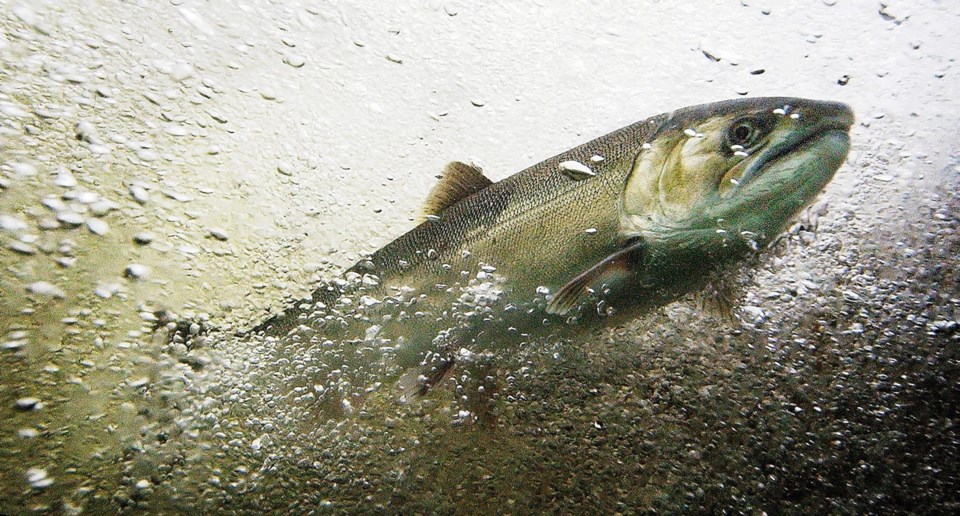The proposed oil industry expansion on B.C.’s coast is not worth the risk to wild salmon, says a new report by the Raincoast Conservation Foundation.
“The public needs to know our concerns,” said Misty MacDuffee, the Sidney-based organization’s lead researcher.
She said a thorough look at the affects of the oil industry on B.C. salmon habitats is crucial because of a lack of recent data on the state of the species in the province. It is also timely as plans for two major oil pipeline expansions along the B.C. coast move ahead.
A federal joint review panel will issue recommendations on the Enbridge Northern Gateway Pipeline on Thursday. Federal approval is expected next year. The project is the subject of Vol. 1 of Raincoast’s report, Embroiled: Salmon, Tankers and the Enbridge Northern Gateway Proposal. The second volume, which focuses on the Kinder Morgan Trans Mountain Pipeline, will be released in February.
On Monday, Kinder Morgan officially filed plans to expand its pipeline with the National Energy Board. The $5.4-billion project would triple capacity for shipping tankers to carry 890,000 barrels of oil a day between Edmonton and Burnaby. Public consultations are to be announced.
“These projects are going ahead and it will be up to the citizens of this province to say what they want for the future,” MacDuffee said.
The study is a response to public concern raised in Northern Gateway consultations and largely uses scientific data gleaned from the Exxon Valdez oil spill off the coast of Alaska in 1989.
“There is a lot of value from Exxon Valdez because prior [to the spill] it was a cold-water, pristine salmon habitat — much like our coast,” MacDuffee said. “There are 20 years of studies that came out of it … showing long-term effects.”
The acute effects of a major oil spill are documented but there’s also the chronic issues, the effects of small spills over time and on the developmental stages of all species of salmon in the area.
“One of our biggest concerns is spawning in intertidal streams where oil has seeped below the gravel and toxins are released at very low concentrations over the years,” MacDuffee said.
“This can kill the embryos outright or have sub-lethal effects on fry, [such as] spinal deformities and inflammation of the organs.”
The study also seeks to clarify the extent of salmon streams and habitat that could be affected by the Northern Gateway project, which would transport bitumen from the Alberta oilsands to Kitimat before being shipped to Asia.
MacDuffee said not all streams and salmon habitat are formally catalogued by Fisheries and Oceans Canada and several were omitted from Enbridge’s research.
“They did such a cursory review of salmon it was shocking,” MacDuffee said, adding the report also explores newer areas of concern such as the effects of increased shipping traffic in salmon habitats and low-level noise.
Ivan Geisbrecht, spokesman for Enbridge’s Northern Gateway project, said no additional research has been done since the joint review hearings ended a few months ago, because federal fisheries and aboriginal groups do not want to enter discussions until a decision on the project is made.
“We’ve made meaningful changes to our project — including a $500-million package of safety enhancements and route revisions — as a direct result of these consultations,” he said. Enbridge also studied the effects of Exxon Valdez.
“This research included multi-year studies on the effects of oil on salmon eggs and fry, as well as fish habitat,” Geisbrecht said. “One of the lessons learned from the spill is that detailed information is required on environmental quality and marine habitat conditions.”
He said Enbridge is well aware that spills can harm the environment, which is why the project invests heavily in prevention and spill preparedness.
“The reality is that spills are rare events,” he said.
Alexandra Morton, a Sointula-based marine biologist and wild-salmon advocate, surveys salmon health along B.C.’s coast throughout the year.
She said the current state of salmon in the province is all over the map, and a lack of organized research makes it hard to predict.
“In general, it’s volatile and fragile,” Morton said. “To add another stressor is not good.”
Fisheries and Oceans Canada has not conducted its own study into the effects of Northern Gateway, but did provide advice on the environmental assessment.
It would not comment on the data submitted by the company, citing respect for the joint review panel process.
• To read the full report, go to: http://www.raincoast.org/wp-content/uploads/EMBROILED_Dec16_final.pdf



